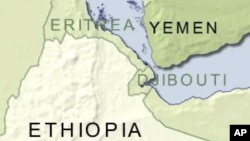Ethiopia is introducing a media code of conduct governing the behavior of journalists covering the May elections for parliament. Press associations are challenging the regulations.
The document tentatively approved by Ethiopia's National Electoral Board places restrictions on reporters covering the pre-election campaign, the voting, and the results. It outlaws distributing news report that might 'foment political instability', and bans reporters from making predictions about the outcome.
Voting will be May 23rd, but official results are not due until nearly a month later.
For minor violations, journalists could be stripped of their government license to report. Serious violations could result in criminal penalties, including fines and jail terms.
Electoral Board spokesman Mohamed Abdurahman says the rules are intended to safeguard freedom of expression.
"Journalists are human beings," Abdurahman said. "They are not different from other communities in society. Everybody has rights. If he violates others rights and causes damage to the public or individuals, he will be treated according to what he has done."
Ethiopia's last election for parliament ended in violence when opposition activists took to the streets to protest alleged vote-rigging by the government. Nearly 200 protesters were gunned down.
Scores of opposition leaders and journalists, including some VOA Amharic Service employees, were accused of inciting the violence. Dozens of local reporters were imprisoned.
Election Board spokesman Mohamed says the proposed rules for this next election specifically prohibit reporting 'hate speech' that could provoke ethnic or religious rivalries.
"If some journalist comes up with a report that causes public turmoil, a clash between the public, violence between the mass public, that is a serious problem by bringing some hate speech by some group, if it comes up with reporting and causes a serious problem to the public peace and order, it will be treated accordingly," Abdurahman said.
Ethiopia's Prime Minister Meles Zenawi recently said he would order jamming of VOA's Amharic Service in the pre-election period. He compared the service to Radio Mille Collines, which was accused of helping to incite the 1994 genocide in Rwanda.
VOA rejected that characterization. Director Danforth Austin said comparing VOA Amharic to the genocidal Radio Mille Collines broadcasts is both 'incorrect and unfortunate'.
Ethiopian media groups have objected to the proposed code. Mekonnen Teshome, deputy general secretary of the Ethiopian National Journalists Union, says rules governing reporters' conduct should be made and enforced by their peers, not the government.
"The mandate of adopting such a law should not be given to the National Electoral [Board]," Abdurahman said. "They say they have the mandate to adopt a Code of Conduct for journalists, but we consistently insisted that we professionals should do that."
Mekonnen says the proposed rules effectively give a government agency arbitrary power to rule on the fairness of election coverage.
"Journalists are fearful to report anything, because it is not clear. What they put here (in the document) is not clear," Abdurahman said.
Government spokesman Shimelis Kemal said Tuesday officials are reconsidering the code of conduct in light of reporters' objections. He told VOA there is growing sentiment for a code voluntarily enacted by journalists.
But others contacted for this report suggested that with election day less than two months away, and given the differences of opinion among journalists about the code's contents, the government rules may be the only option.
Ethiopian Media Challenge Election Coverage Code of Conduct




